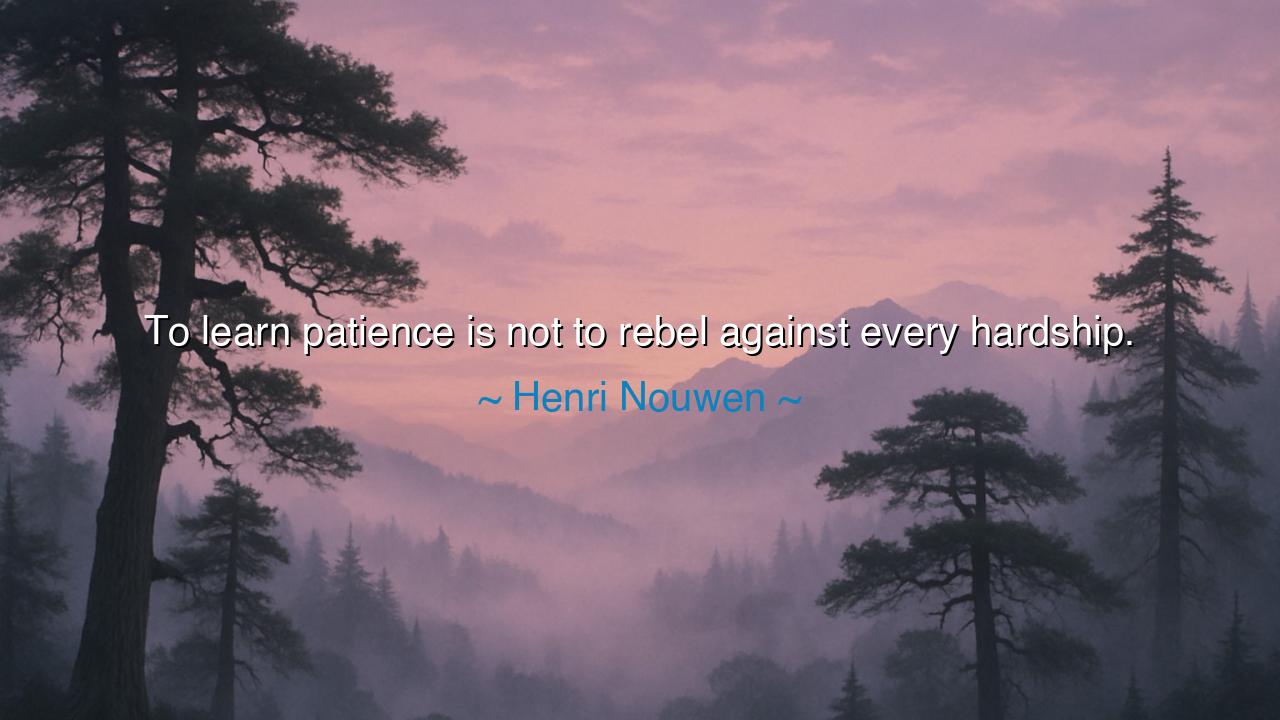
To learn patience is not to rebel against every hardship.






Henri Nouwen, the gentle guide of hearts, once said: “To learn patience is not to rebel against every hardship.” These words, simple in form yet vast in meaning, call us back to the ancient truth that life is not without suffering, nor is suffering always an enemy. To learn patience is to walk through the fire without thrashing, to drink the bitter cup without shattering it in anger, and to endure hardship not as chains that bind us, but as teachers that refine us.
When Nouwen speaks of “not rebelling against every hardship,” he does not mean we must surrender to injustice or become slaves to cruelty. He means that life will inevitably place obstacles before us, and to fight against every discomfort, every difficulty, is to waste our strength in futility. The one who rebels at every hardship becomes weary, bitter, and blind to the hidden gifts of endurance. But the one who embraces patience finds within the storm a hidden stillness, and within the burden a hidden strength.
Consider the story of Job, that ancient figure of sorrow. Stripped of wealth, health, and family, Job faced hardships beyond measure. He questioned, he lamented, yet he did not curse the path laid before him. In his patience, he discovered not only the limits of his own strength, but the boundless depth of faith. His endurance became a beacon for countless generations. Here we see Nouwen’s teaching revealed: rebellion against every hardship breeds despair, but patience carves a road through even the darkest night.
History, too, provides a mirror in the life of Nelson Mandela. For twenty-seven years he sat behind prison bars, enduring injustice. Had he rebelled in anger against every blow, every insult, every hardship, he would have destroyed his spirit. Instead, he chose patience—not passive waiting, but active endurance. Through this patience, his soul was not broken, but tempered like steel. When freedom came, he emerged not with vengeance, but with vision, becoming a healer to his nation. His life proves that patience in hardship can transform suffering into victory.
The wisdom of Nouwen lies in his reminder that hardships are not strangers to be cast out, but teachers sent to us. To rebel against every difficulty is to close one’s ears to the lesson. Hardship whispers: “Grow stronger. Grow wiser. Grow deeper.” Patience answers: “I will endure. I will listen. I will learn.” Without such patience, hardship is wasted pain; with it, hardship becomes the forge in which character is made.
The lesson is plain: we must choose how we face the trials of life. When obstacles arise, do not thrash in rebellion, nor curse your fate at every turn. Instead, pause. Breathe. Ask: what does this hardship seek to teach me? How may I be refined by this trial? By such reflection, we transform our wounds into wisdom, and our struggles into stepping-stones toward growth.
Therefore, I counsel you: cultivate patience. When life presses upon you, do not see every hardship as an enemy to be destroyed. Some battles must be fought, yes—but others must be endured with quiet strength. Practice waiting without despair, enduring without resentment, hoping without bitterness. In this way, hardship loses its sting and becomes a path toward maturity of soul.
So let Henri Nouwen’s words echo across the generations: “To learn patience is not to rebel against every hardship.” Take them into your heart as a shield and as a lamp. When trials come—and they will—may you bear them not with rebellion, but with patience. And in that patience, may you find not only survival, but transformation, and the discovery of a strength that no hardship can destroy.






AAdministratorAdministrator
Welcome, honored guests. Please leave a comment, we will respond soon